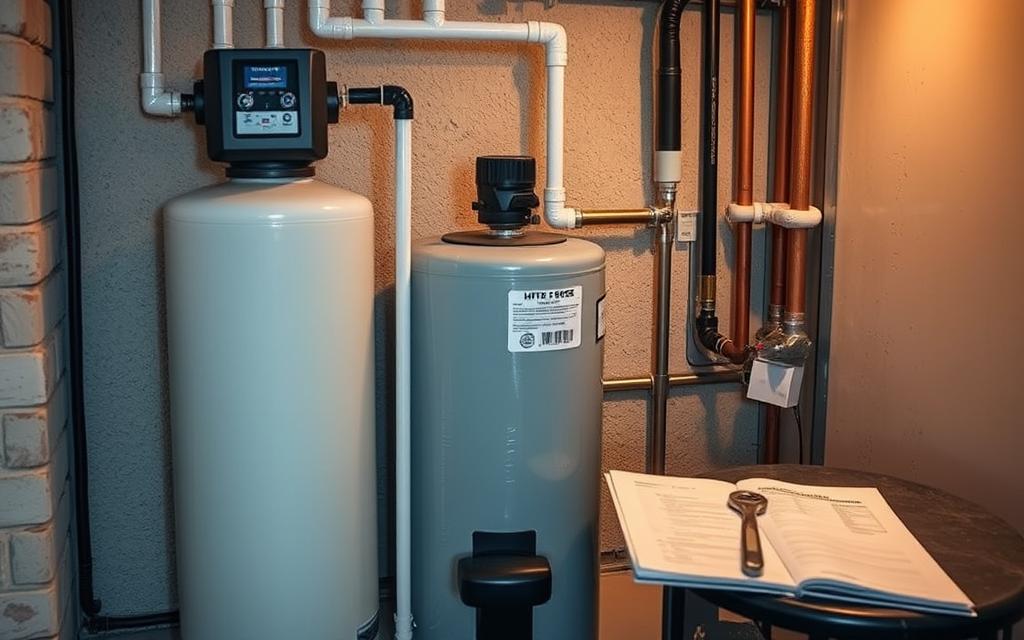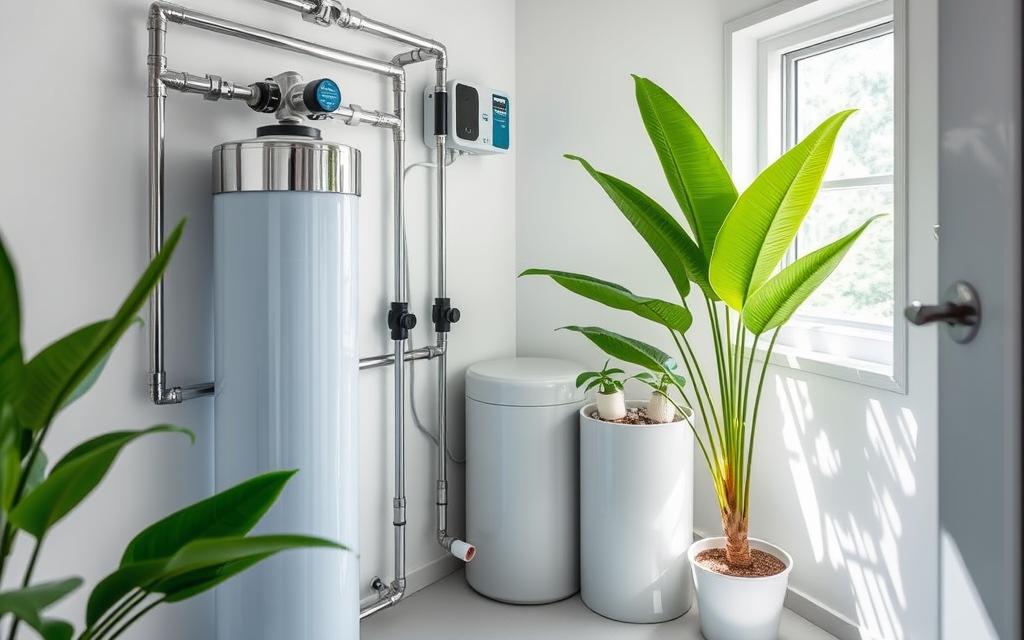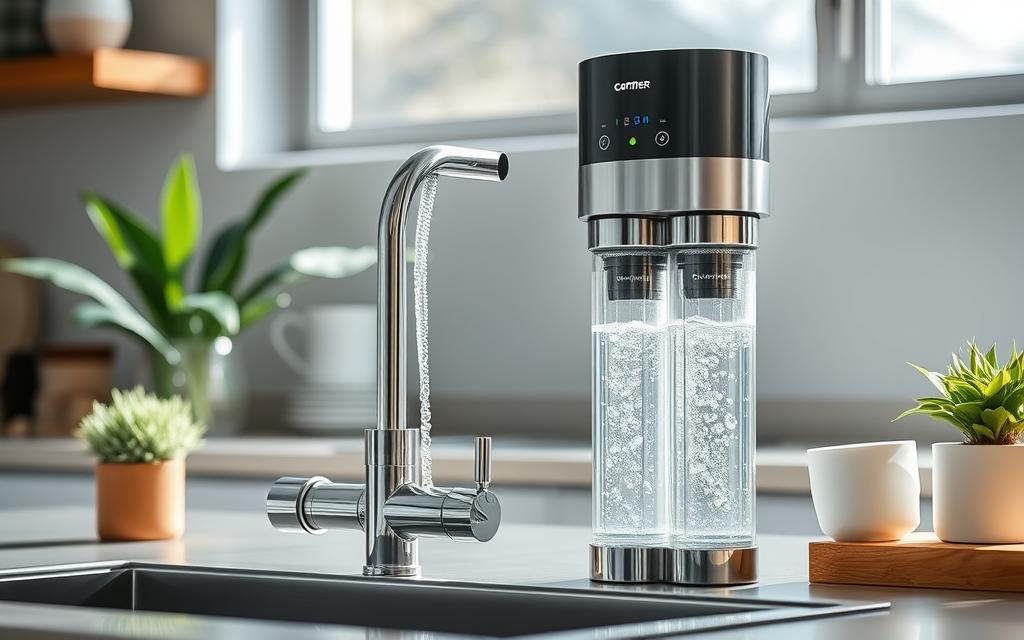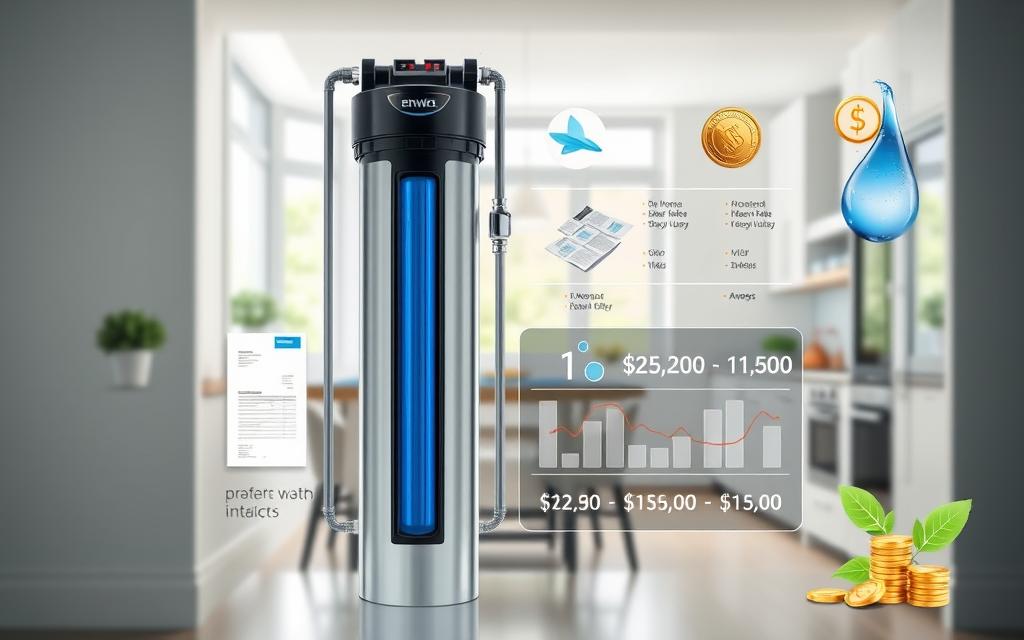Do you struggle with hard water in your home? It can cause limescale buildup, soap scum, and faded clothes. But, there’s a simple solution to fix this. Welcome to our guide on the best water conditioners for your whole home.
We’ll explore the latest water conditioning systems and their benefits. You’ll learn how to find the perfect one for your home. Whether you’re fighting mineral deposits or want better water quality, we’ve got you covered.
Ready to end hard water problems and enjoy a cleaner home? Let’s find the best water conditioner for your whole house together.
Key Takeaways
- Discover the latest advancements in whole-home water conditioning systems
- Understand the differences between traditional water softeners and modern, salt-free alternatives
- Explore the benefits of whole-house water treatment, from improved plumbing to appliance longevity
- Learn how to size your water conditioner for optimal performance
- Gain insights into installation requirements, maintenance, and long-term cost considerations
Understanding Water Conditioning Systems and Their Importance
Water conditioning systems are key to keeping our home water quality high. They do more than just soften water. They tackle many water issues, like hard water and improving overall water quality.
How Water Conditioners Differ from Traditional Softeners
Water softeners mainly remove calcium and magnesium. But, water conditioners handle a wider range of problems. They use technologies like filtration and ionization to fight scale buildup and other contaminants.
Benefits of Whole House Water Treatment
- Improved water quality for all household uses, from drinking and cooking to bathing and cleaning
- Protection for plumbing, appliances, and fixtures from the damaging effects of hard water
- Enhanced efficiency and longevity of household appliances, leading to cost savings
- Reduced soap and detergent usage, resulting in fewer suds and residues
- Cleaner, softer skin and hair, and reduced scaling on showerheads and faucets
Impact on Plumbing and Appliances
Hard water can cause many problems, like clogged pipes and reduced water flow. Water conditioners prevent scale buildup, helping your home’s plumbing and appliances last longer.
“Investing in a whole-house water conditioning system can pay dividends in the long run by protecting your home’s plumbing and appliances from the damaging effects of hard water.”
Types of Whole House Water Conditioners Available Today
There are many ways to treat hard water in your home. You can choose from traditional salt-based softeners to salt-free water conditioners and electronic water descalers. Each option has its own features and benefits. Let’s look at what’s available and what they offer.
Salt-Based Water Softeners
Salt-based water softeners are a common choice. They use ion exchange to remove hardness minerals, replacing them with sodium. While they work well, they need regular salt to keep working.
Salt-Free Water Conditioners
Salt-free water conditioners are a greener option. They change hardness minerals into harmless crystals. This stops them from sticking to surfaces, without using salt or needing to be recharged.
Electronic Water Descalers
Electronic water descalers are a new way to treat water. They use electromagnetic fields to change the shape of hardness minerals. This stops them from forming scale. They’re easy to use and don’t need chemicals or filters.
Choosing the right water conditioner depends on several things. Consider your water’s hardness, the system’s size, energy use, and upkeep needs. Knowing about the different types helps you pick the best one for your home and your lifestyle.
Salt-Free Water Conditioners vs Traditional Salt-Based Systems
Homeowners are looking for green water treatment options. They compare salt-free water conditioners to traditional salt-based softeners. Both tackle hard water issues but in different ways.
Environmental Impact Comparison
Salt-free water conditioners are better for the planet than traditional softeners. They use tech like template-assisted crystallization (TAC) to soften water without salt or harsh chemicals. This is good news for those worried about the environmental harm of salt-based systems.
Cost Analysis: Initial and Long-term
At first, salt-free systems might cost a bit more. But they save money in the long run. They need less upkeep, like no salt refills or backwashes, cutting down on utility and maintenance costs. This makes them a smart choice for many, saving money and the planet.
Maintenance Requirements
- Salt-free systems need less care than salt-based ones, with no salt refills or backwashes.
- Salt-based systems need salt refills and filter changes, which can be costly and time-consuming.
- With fewer parts, salt-free systems are easier to maintain, saving homeowners time and money.
Homeowners can weigh the green benefits, cost savings, and upkeep needs to choose the right water conditioner. Whether it’s salt-free or traditional, the decision should fit their lifestyle and budget.
| Feature | Salt-Free Water Conditioners | Traditional Salt-Based Softeners |
|---|---|---|
| Environmental Impact | Environmentally friendly, no salt discharge | Can contribute to salt buildup in water sources and soil |
| Initial Cost | Slightly higher | Slightly lower |
| Long-term Cost | Lower maintenance costs | Higher maintenance costs (salt, backwashing, etc.) |
| Maintenance | Low maintenance, fewer moving parts | Requires regular salt replenishment and filter replacements |
Best Water Conditioner for Whole House: Top Picks for 2024
Choosing the right water conditioner for your whole house can be tough. But, after lots of research and testing, I’ve found the top whole house water conditioning systems for 2024. These systems make your water better and protect your plumbing and appliances from hard water damage.
- Aquasana Whole House Water Filter and Salt-Free Softener: This system is great because it filters water and softens it without salt. It’s perfect for those who want clean water and less scale buildup without salt-based systems.
- Fleck 5600SXT Digital Water Softener: This is a top salt-based water softener. It has a digital control and regenerates automatically. This ensures your home always has soft water.
- Pelican Whole House Water Filter and Salt-Free Conditioner: This uses special technology to soften water without salt. It’s good for the environment and easy to maintain.
| Product | Filtration Technology | Softening Capacity | Installation |
|---|---|---|---|
| Aquasana Whole House Water Filter and Salt-Free Softener | Multi-stage filtration | Salt-free softening | Professional installation recommended |
| Fleck 5600SXT Digital Water Softener | N/A | 29,000 to 80,000 grains | Professional or DIY installation |
| Pelican Whole House Water Filter and Salt-Free Conditioner | Multi-stage filtration | Salt-free conditioning | Professional installation recommended |
When picking the best water conditioning equipment for your home, think about water hardness, flow rate, and your needs. A good whole home water softening system will give you cleaner, softer water. It also helps your plumbing and appliances last longer.
Electronic Water Descalers: Modern Solution for Hard Water
Are you fed up with hard water’s problems like mineral buildup and stains? An electronic water descaler could be your answer. These devices are a salt-free, eco-friendly way to fight hard water. They work without the need for traditional water softeners.
How Electronic Descaling Technology Works
At the core of an electronic water descaler is its anti-scale technology. It changes the molecular structure of minerals in water. This stops them from sticking to pipes and appliances. This method, called “ion transformation,” stops hard water from forming scale, but keeps the good minerals.
Unlike salt-based softeners, electronic descalers don’t remove minerals. They keep the essential minerals in your water. This is better for the environment and helps your plumbing and appliances last longer.
Installation and Maintenance Tips
- Installing an electronic descaler is easy, often needing no plumbing changes. They can be placed on the main water line for whole-house protection.
- They require little upkeep, with no salt to replace or moving parts. Just a quick clean now and then keeps them working well.
- These descalers are also compact, fitting easily in small spaces. They’re great for homes with limited room.
If you want a simple, eco-friendly way to solve hard water problems, consider an electronic water descaler. Its advanced technology and green benefits make it a smart choice for your home.
Sizing Your Water Conditioner: Finding the Perfect Match
Choosing the right water conditioner is key. It must fit your home’s unique needs. Here’s a guide to help you find the perfect size for your whole house water filtration system.
Factors to Consider
- Water Hardness Level: Check your water’s hardness in grains per gallon (gpg). This ensures the conditioner can remove minerals and scale effectively.
- Household Size: Think about how many people live in your home and their water use. This helps determine the system’s needed capacity.
- Flow Rate: Look at your home’s water flow rate. It shows if the conditioner can handle demand during busy times.
- Water Usage: Guess your daily and weekly water use. Choose a conditioner that meets your family’s needs without wasting water.
By thinking about these factors, you can pick the best water treatment solutions. They will work well for your home, solving hard water problems and protecting your plumbing and appliances.
Sizing Your Tankless Water Conditioner
For home water filtration systems, size is measured in grains of hardness removal per gallon (gpg). To find the right size, calculate your daily water use and multiply it by your water hardness level. This tells you how many grains of hardness need to be removed each day.
With this info, choose a tankless water conditioner that can handle your daily needs. This ensures your home always has great water.
“Choosing the right size water conditioner is key for your home’s best performance and efficiency.”
Installation Requirements and Considerations
Getting a whole house water treatment system is a smart move. But, the installation is key and needs careful planning. You can choose to hire a pro or do it yourself. Knowing what to expect makes the process easier and faster.
Professional vs DIY Installation
Homeowners can pick between hiring a plumber or doing it themselves. Professional installation means the system is installed right, following all rules. It might cost more, but you’ll know it’s done right. On the other hand, DIY installation can save money if you know plumbing. But, you need to pay close attention to details to make sure it works right and safely.
Required Tools and Materials
Whether you hire a pro or do it yourself, having the right tools and materials is key. The list can vary based on your system, but usually includes:
- Plumbing supplies (pipes, fittings, valves, etc.)
- Wrenches and pliers
- Tape measure and level
- Drill and drill bits
- Sealants and lubricants
- Water treatment system components
Having everything you need before starting can make the installation smoother and faster.
“Proper installation is key to the long-term performance and efficiency of a whole house water treatment system.”
Whether you hire a pro or do it yourself, knowing what to expect is important. With good planning and preparation, your home will have the best water quality and protection against scale.
Maintenance Schedule and Long-term Care
Keeping your water softener systems or low maintenance water conditioners in good shape is key. It ensures they last longer and work better. To keep your water purification system running well, follow this simple maintenance schedule:
- Regular Checks: Check your system every 3-6 months for any signs of wear or issues.
- Filter Replacements: Replace filters as the manufacturer suggests, usually every 6-12 months. This keeps water flowing well and staying clean.
- Salt or Media Refills: For salt-based softeners, keep the brine tank filled with the right salt. For salt-free conditioners, replace the media as directed.
- Cleaning and Descaling: Clean the system parts now and then to prevent buildup and scale. This keeps it working efficiently.
By following these maintenance steps, you can make your water softener systems or low maintenance water conditioners last longer. This keeps your home’s plumbing and appliances safe from hard water damage.

Remember, regular care and attention can greatly improve your water purification system’s performance and lifespan. If you run into any unexpected problems, check the manufacturer’s troubleshooting guide. Or, get help from a professional.
Water Quality Testing and Monitoring Methods
It’s important to check your home’s water quality. This is key for your hard water treatment or water conditioning equipment to work well. Regular testing helps spot problems early and guides your water quality improvement choices.
Common Water Quality Issues
Homeowners often face several water quality problems. These include:
- High levels of minerals like calcium and magnesium, leading to hard water
- Presence of contaminants such as bacteria, heavy metals, or chemicals
- Unpleasant tastes, odors, or discoloration of the water
- Damage to appliances and plumbing due to scale buildup
Testing Equipment Recommendations
For testing your home’s water, consider these tools:
- Digital water testing kits: These kits measure pH, hardness, chlorine, and more.
- Water hardness test strips: They quickly show your water’s hardness level and changes.
- TDS (Total Dissolved Solids) meter: It checks your water’s mineral content, giving insights into its quality.
- Bacterial test kits: They find harmful microorganisms, ensuring your drinking water is safe.
Regular water quality checks and addressing issues help your water conditioning equipment work better. They also keep your plumbing system healthy and long-lasting.
Cost Analysis: Investment and Return Considerations
Choosing a whole home water treatment solution is a big decision. It affects your household for years to come. When looking at water treatment solutions, think about the cost upfront and the savings later.
Salt-free water conditioners are great because they save money. They don’t have the high costs of whole home water softening systems. Even though they cost more at first, they save money in the long run because they use less energy and need less maintenance.
| Cost Comparison | Salt-Free Water Conditioner | Traditional Water Softener |
|---|---|---|
| Initial Investment | $800 – $2,000 | $500 – $1,500 |
| Annual Operating Costs | $0 – $100 | $100 – $400 |
| Maintenance Requirements | Minimal | Regular salt refills and filter changes |
| Lifespan | 10-20 years | 5-10 years |
Also, salt-free water conditioners save money in the long run. They use less energy, last longer, and save on plumbing repairs. By looking at the costs and savings, you can choose wisely for your budget and needs.
Choosing a whole house water treatment system is a big decision. It depends on your water quality, household needs, and money. Knowing the costs and savings helps you make a smart choice for your home and family.
Environmental Impact and Sustainability Features
Choosing the right whole house water treatment is key for eco-friendly homes. We aim to lower our carbon footprint and environmental impact. An environmentally friendly water treatment is essential in this quest.
Energy Efficiency Ratings
Energy efficiency is a critical factor in water treatment systems. Salt-free water descalers use less energy than traditional salt-based softeners. This makes them a greener choice. Choosing energy-efficient models helps save money and the planet.
Waste Reduction Benefits
Waste from water treatment systems is another important factor. Anti-scale treatment without salt or harsh chemicals reduces waste. This is good for the environment and local water treatment facilities.
When picking a water conditioner, look for energy efficiency and waste reduction. This choice improves your water quality and supports a greener future.
“Embracing sustainable water treatment solutions is not only good for the planet, but it can also save you money in the long run. It’s a win-win for both the environment and your wallet.”
Common Problems and Troubleshooting Guide
As a homeowner with a whole house water conditioning system, I know how vital it is to keep it in top shape. These systems are built for reliability, but sometimes issues pop up. In this guide, I’ll cover common problems and solutions to help you keep your equipment running well.
One big challenge is mineral scale buildup. It can slow down your system and cut down water flow. Regular maintenance, like cleaning and descaling, is key. Always follow the manufacturer’s guide or get help from a pro to keep your scale prevention devices working right.
Leaks are another common issue. They can happen in many parts of the system. If you see water leaking, find the source fast and fix it. You might need to tighten connections, replace seals, or fix structural problems. Sometimes, it’s best to call a skilled technician to avoid more damage or water waste.



